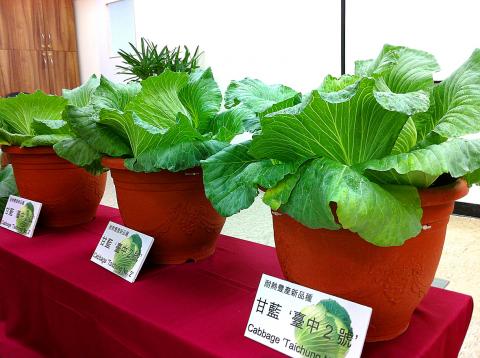The Council of Agriculture yesterday unveiled the Taichung No. 2, its newly cultivated cabbage species, which can withstand summer heat and can be grown at low altitude.
The council’s Taichung District Agricultural Research and Extension Station said that although cabbage is a popular vegetable, the environment in which it grows is limited to warm and chilly climates, so it is mostly grown in the winter and needs to be imported from overseas in the summer.
The majority of cabbage species grown in Taiwan at present are from Japan, and among them, the species of early-autumn cabbage has a high market share rate of 70 percent and has dominated the market for more than 50 years, the station said. However, the species is intolerant to heat and therefore has to be grown at high altitudes, it said.

Photo: CNA
In recent years, another species — cabbage 228 — has become the most heat-tolerant species in Taiwan, but its appearance and taste are not that good, the station added.
The new species has a bright, colorful appearance, fluffy leaves and tastes sweet, with fewer fibers, station director Chang Chih-sheng (張致勝) said.
“People will be refreshed and surprised when they take a bite of the new cabbage species, because it tastes very crispy, sweet and has a good texture, with fewer fibers,” Chang said.
More importantly, the Taichung No. 2 is more heat-resistant and can be grown on plains during the summer, and has a shorter growing period, of about 60 days in the summer and about 72 days in autumn and winter, he said.
Consumers may be able to purchase the cabbage as early as next summer, Chang added, saying the new species may lower costs and solve environmental issues.

An essay competition jointly organized by a local writing society and a publisher affiliated with the Chinese Communist Party (CCP) might have contravened the Act Governing Relations Between the People of the Taiwan Area and the Mainland Area (臺灣地區與大陸地區人民關係條例), the Mainland Affairs Council (MAC) said on Thursday. “In this case, the partner organization is clearly an agency under the CCP’s Fujian Provincial Committee,” MAC Deputy Minister and spokesperson Liang Wen-chieh (梁文傑) said at a news briefing in Taipei. “It also involves bringing Taiwanese students to China with all-expenses-paid arrangements to attend award ceremonies and camps,” Liang said. Those two “characteristics” are typically sufficient

A magnitude 5.9 earthquake that struck about 33km off the coast of Hualien City was the "main shock" in a series of quakes in the area, with aftershocks expected over the next three days, the Central Weather Administration (CWA) said yesterday. Prior to the magnitude 5.9 quake shaking most of Taiwan at 6:53pm yesterday, six other earthquakes stronger than a magnitude of 4, starting with a magnitude 5.5 quake at 6:09pm, occurred in the area. CWA Seismological Center Director Wu Chien-fu (吳健富) confirmed that the quakes were all part of the same series and that the magnitude 5.5 temblor was

The brilliant blue waters, thick foliage and bucolic atmosphere on this seemingly idyllic archipelago deep in the Pacific Ocean belie the key role it now plays in a titanic geopolitical struggle. Palau is again on the front line as China, and the US and its allies prepare their forces in an intensifying contest for control over the Asia-Pacific region. The democratic nation of just 17,000 people hosts US-controlled airstrips and soon-to-be-completed radar installations that the US military describes as “critical” to monitoring vast swathes of water and airspace. It is also a key piece of the second island chain, a string of

The Central Weather Administration has issued a heat alert for southeastern Taiwan, warning of temperatures as high as 36°C today, while alerting some coastal areas of strong winds later in the day. Kaohsiung’s Neimen District (內門) and Pingtung County’s Neipu Township (內埔) are under an orange heat alert, which warns of temperatures as high as 36°C for three consecutive days, the CWA said, citing southwest winds. The heat would also extend to Tainan’s Nansi (楠西) and Yujing (玉井) districts, as well as Pingtung’s Gaoshu (高樹), Yanpu (鹽埔) and Majia (瑪家) townships, it said, forecasting highs of up to 36°C in those areas